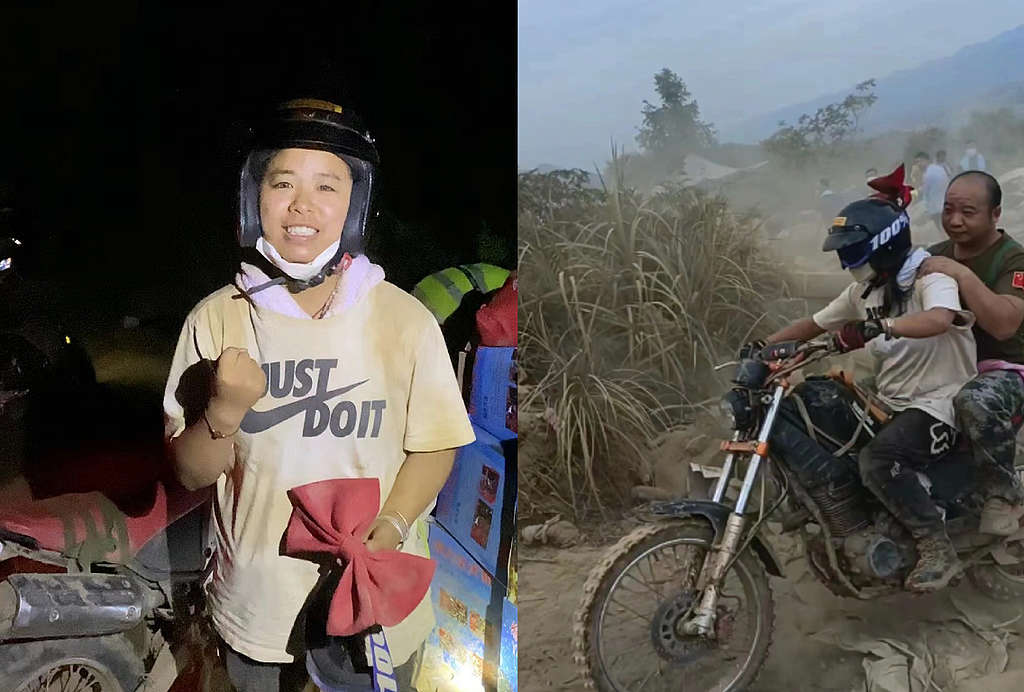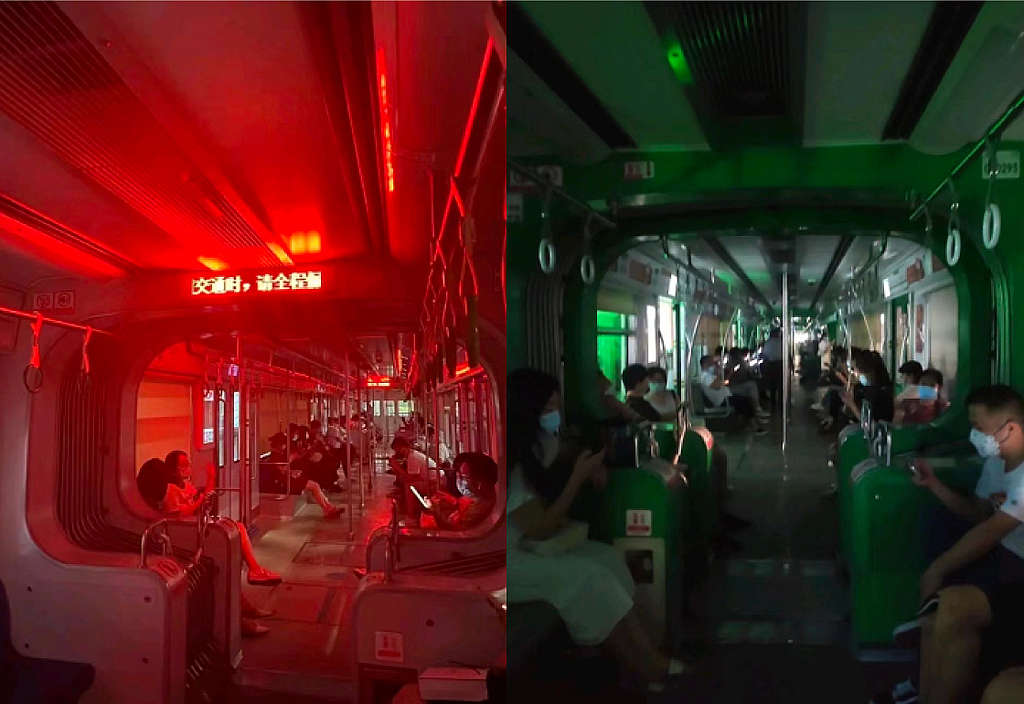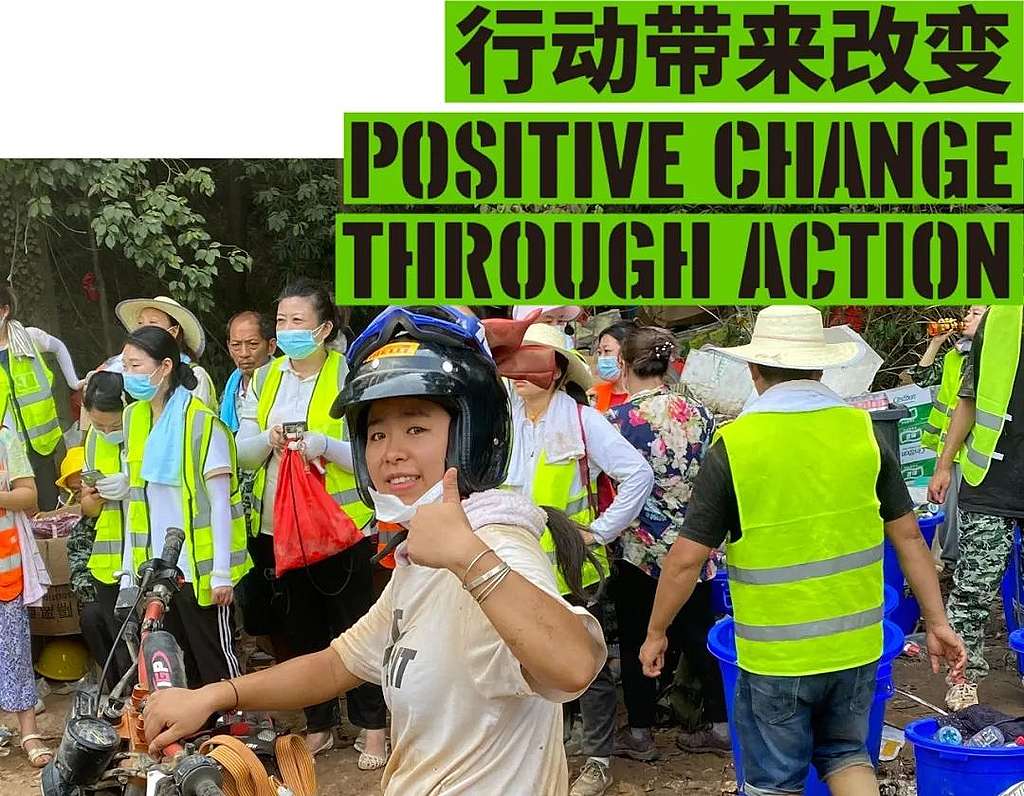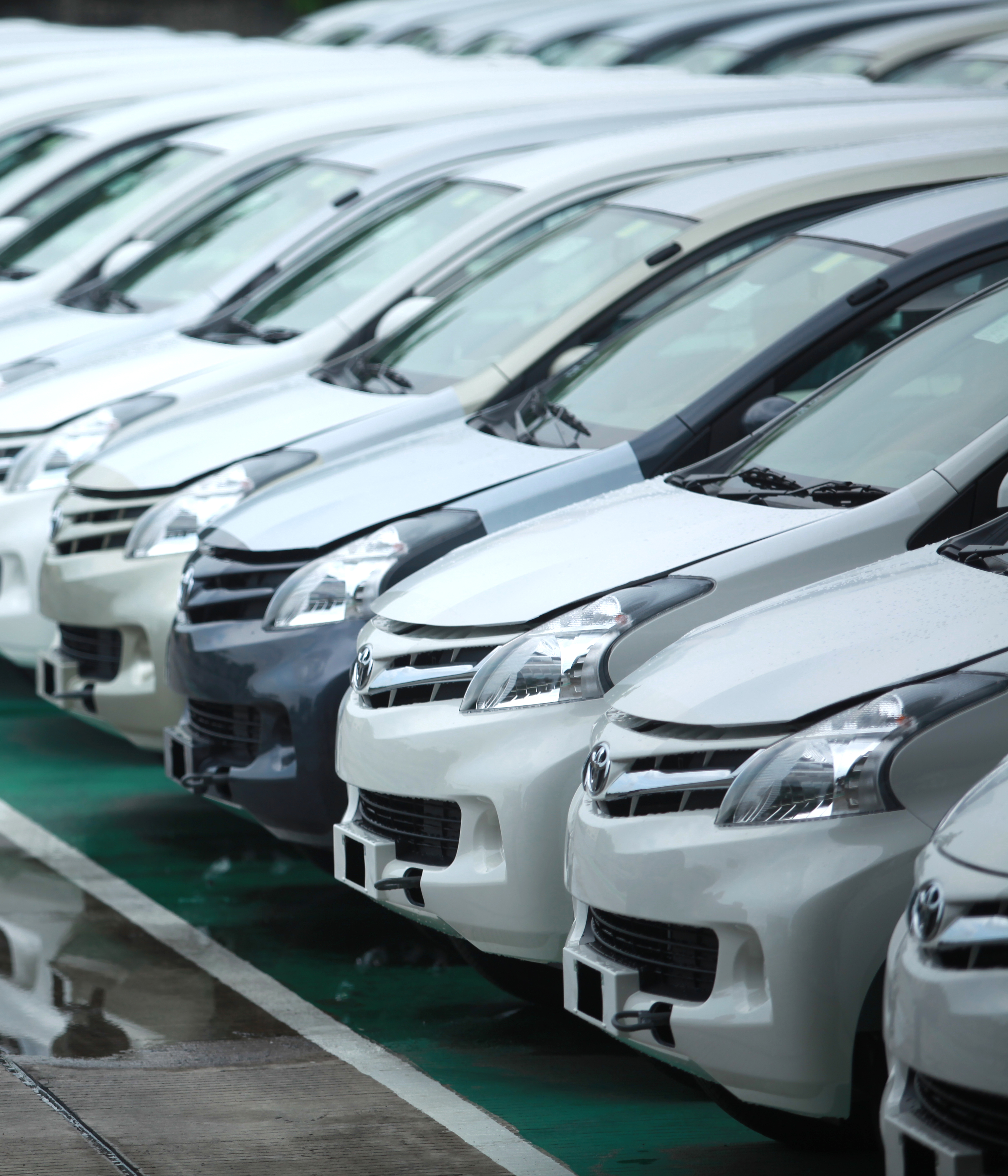By Wu Puhui, as told to Yang Guan
Editor’s note: Chongqing, in southwestern China, is the country’s most populous city with 31 million people. As a historically-unprecedented heatwave baked southern China, this megalopolis tucked between three huge mountain ranges suffered from wildfires and a massive volunteer effort stepped up to help fight the fires.

Chongqing, August 22, 9 AM – I’d just gotten up and was scrolling through my phone. I saw someone in the motocross group chat say: “Bros, they need motorcycles to help transport supplies in Beibei. It’s super urgent.”
I found the location, and saw it would take an hour and a half for me to get there. About ten of us headed over [just on scooters and normal motorbikes].
When we arrived at the base station, there were vehicles everywhere: supply vehicles, motorbikes, scooters, fire trucks. When we got there, the organizers looked at our scooters and motorbikes, strapped supplies to the side, said “good work!” and sent us off to different camps across the mountain. There wasn’t much talk – it was all understood: you know I’m here to help. I know you’re here to help.
My first trip, I didn’t really know what I was doing. My only protection was a face guard. A lot of the riders didn’t even anything to cover their faces. It’s all uphill from the base station to the fire fighter camps, and it gets steeper the farther you go. Dust was blowing around everywhere. It got in my eyes and mouth.
By 5 or 6 PM, there were piles of supplies at the base station and the supply trucks had all left. The mountain roads around Chongqing are endless, and the camps were scattered across the hillsides, and then there were paths from each camp to the front lines.
The roads are narrow. Locals usually ride ordinary motorcycles or scooters. It’s much harder to deliver supplies. It was hard dangerous and hard to maneuver, so they stopped making trips. The front line had no way to get supplies to fight the fire. There was a huge shortage of people. Someone kept shouting, “Hurry up, there’s no fire extinguisher! No water! No saws!”
I wanted to give it a shot and see if I could make it the frontline on a scooter. I couldn’t let the people at the front go hungry. At that time, we still only had the scooters. I tried it once and made it all the way, and then just made non-stop trips.
The roads to the front line were rough. They’d all been newly dug out with excavators and they were covered in ash. It was easy to slip. Some roads your foot would sink right in if you stepped off the bike. Or you could run into rock piles across the road. It would take a lot of time. The scooter isn’t very powerful. A lot of the time it couldn’t make it across or it would wobble and shake on the rocky parts.
One trip I took more than a dozen fire extinguishers on the scooter. The scooter was heavier than me and I just did my best to hold on. Everyone said don’t worry too much about the fire extinguishers falling – safety first. But I felt like if I dropped it I then have to go pick it up and it’s makes a big hassle, so I can’t slip up.
The closer you get to the front line, the thicker the smoke. The fire gets louder and louder and you can see the ashes floating in front of you. The temperature goes up quickly and it gets hot like you just entered a sauna. It’s also more dangerous the closer you get to the front line, and at times you’re riding by parts that are still on fire.
One trip, I saw the fire roll down the mountain from the top, with the wind blowing downhill, and in a few minutes it scorched half the mountainside in a few minutes. That time, I was scared. Everyone kept saying “turn around!” and “go back!” to each other but even as we said it we all kept making trips. They were still fighting the blaze, so I kept delivering water up the mountain.
When I got to the front line, I saw a firefighter laying on the ground exhausted. His body was all ashy. The fire wasn’t that far away. I heard people shouting, “Fire extinguishers! Fire extinguishers! Fire extinguishers!” So I parked the scooter, and we started passing fire extinguishers up one to the other in a chain right into the front line.
The first day, I did about 30 or 40 trips from the base station to the front line. Some trips are shorter – only a few minutes. I did those more than a dozen times. Longer trips would take 30 or 40 minutes. After the first day, I was already exhausted, but wanted to keep helping deliver supplies.
By 9 PM, the guy in charge of the front line noticed I hadn’t eaten anything and got them to take my keys and make me have a rest. I felt really moved by that.
At 10 PM that night I went home and slept for four hours. But I saw in the group that they were running low on supplies, and I couldn’t sleep at all.
August 23, early morning – The second day, we all got our off-road motorbikes and headed to the main dispatch center. The off-road bikes could make it deeper into the mountains.
I was probably the only girl who rode the motorbikes to deliver supplies. I’m the kind of girl who runs my own shit and my personality is tomboyish. I’ve been into motocross racing since I was 17 or 18. I’ve done a lot of competitions. Maybe it was meant to be, so I could go help put out the fires.
Because I’m a girl, other volunteers would praise me, and because they were worried about me, they would load my bike with less stuff. Sometimes it would piss me off, and I’d say, “load it all the way up!” Of course I’m going to do everything I can. Whatever you can give me I can take.
Sometimes, when the path is too narrow and you have to find another way, you have to lift the bike to turn it around. Other riders would want to help me turn it. I’d tell them they don’t have to help me, that I can do it on my own, that they should save their energy to help the others.
My biggest worry was falling and affecting the firefighting effort. If I fall, of course lots of people will tell me, “You’re not here help. You’re here to fool around. Look, other people have to come help you get your bike back up and take care of you.” I don’t want to be like that.
My first trip up I didn’t know the road, and went down on part that got super steep, with deep troughs in the road. I had to turn around the bike to find another way. While I was turning the bike around, it fell. There was no one around. My leg was pinned under the bike’s weight. It took a lot of effort to get out from under it. I feel like my survival instinct kicked in. I just wanted to get it off of me.
Each of the camps was different and for each new one I would ask the other riders if it was a trip I could make. I would put the supplies in a woven basket on my back, and would take fewer supplies on my first trip to a new camp to feel it out. I was really afraid of making a mistake and causing problems for the others.
I’m actually really scared of the dark. At night, there are no lights on the mountain, only the bike’s headlamp. The forest was so quiet, and you’re heading into the fire. It was really scary.
I’m also afraid of snakes. Even toy snakes scare me. I’d heard they’d seen hundreds of cobras coming out of the woods because of the fires. I’d get nervous making trips on my own. So, I kept shouting my name out into the forest. I kept telling myself, “it’s all good,” “it’ll be fine,” “no problem,” “you can do this,” to hype myself up. In reality, I was exhausted, but I would just keep riding. I didn’t dare stop if I was making a trip on my own and would only rest once I got to the camp. Asking someone else to go with me wasn’t an option.
There were hundreds of people delivering supplies, and thousands of motorbikes, and more than a hundred off-road motorbikes. Hundreds of us all stayed overnight at the site. We slept on cardboard on the floor. There was no air conditioning, and the weather was so hot that we couldn’t sleep at all.
While we were sleeping, as soon as we heard that there was a shortage of water and supplies, we would get up, put on our helmets, and set off immediately.
I delivered supplies from morning to night. I was so busy that I didn’t have time to drink and eat. But I didn’t feel hungry. The only thing on my mind was getting more supplies up there.
As we made more trips, some of the roads higher up the mountain started to get steeper and the surface got muddier the more trips we made. The smaller bikes’ wheels had dug out the dirt, making it harder for the off-road bikes. We would line up along the road in a human chain and pass supplies up the line. It made for a pretty amazing spectacle.
My boyfriend worried about my safety at first. But he knows me and never tried to stop me. The first day, he had a shift to work in the factory. He came to help the second day. He usually works nights from 8 PM to 8 AM. After he got off, he rode an hour and half to come volunteer. He would sleep two hours here and there when he got too tired. Then he’d ride back to help. The first few days he did logistics. Then, the factory recruited volunteers and he signed up and got assigned to the front line to watch the fire line [a line burned across the forest ahead of the wildfire to isolate it] to prevent re-sparking. He took a fire extinguisher and a shovel and went to survey the line, looking for signs of smoke or combustion.
At first, he was assigned to a place about halfway up the mountainside. But for some of the older people, it was too hard to work higher up the mountain. So he asked to go to the top, where he could see more. In the parts of the mountain where the fire had been, the trees were all scorched black. The ground was hot. There were embers in the ground. He saw smoke coming out of the ground, but nothing was burning. So he turned the soil over with his shovel and found burning embers under the ground.
The wildfires were extinguished, and there’s a risk that embers will reignite, but it was under control. So we were pulled out in the middle of the night on August 25. The next morning, I saw they were still struggling to get supplies, so I went up again that whole day and got home at 2 AM on August 27.
When I got back, I was quarantined for three days at my house because of COVID concerns, which was fine since I needed a rest.
August 27 – You feel fine while you’re still full of nervous energy. I never felt tired while I was moving supplies. Once I stopped, I was exhausted. My head ached. My boyfriend was the same way when he got home. He was extremely dehydrated and felt like he would pass out. He was weak and faint.
My body was constantly overheated while I was delivering supplies. It seems like everyone got heat stroke between the wildfires and the heatwave. My helmet was soaked with sweat. It ran down to my socks and into my boots. It was like I’d been in the rain. My clothes would go from soaked to dry to soaking wet over and over.
This year is too much. Every day in Chongqing it’s over 40 degrees Celsius. It’s like an oven. The weather is hot. I saw outside around 7 PM the moon and the sun were both in the sky at the same time. It all felt so apocalyptic. But then I got used to that, too. And I saw something saying that next year it could be even hotter. I feel like, is the Earth going to explode?
A lot of people here went to the mountains in Guizhou because it’s cooler. We didn’t, because of the pandemic and other reasons. So we holed up in our air-conditioned apartment. I sell second-hand motorbikes and sometimes have to go out to make deliveries. The van’s steering wheel burns. The seat burns. If you sit too long, the skin on your butt breaks out. So I try to not go out as much as possible.
In the past, I’d go to the water park a few times over summer and float around in the water. This year I went at the beginning of August and it was already too hot. I went once and didn’t go back.
Chongqing has power cuts every day now. It’s been like this for maybe a month. Even the metro’s lights are off. Malls are only open for four hours in the afternoon. No streetlights at night. Non-essential manufacturing factories are completely closed.

The heat is fine when you’re inside in the air conditioning. But it’s too much to ask for people to go out and work under the sun. The high temperatures can make your tires explode. Delivering supplies, when a tire blew, we’d just toss the whole bike. One of the bikes spontaneous combusted while in use.
It seems like we always chat about disasters like daily happenings now, and this year there are so many: the heatwave, the fire, the pandemic. The bamboo’s leaves dried up in the sun and the leaves can spontaneously combust. The bamboo trees on the mountainside got baked to a crisp and it didn’t take much for them to turn into a huge blaze.
I don’t know much about climate change or stuff like that. “Climate change” makes me think of global warming, the ice in the Arctic or wherever melting, the temperature rising, the weather getting hotter and hotter.
I don’t know what does what to the climate, but I think about what is happening, and I’ll joke, “maybe let’s not turn on the air conditioner then,” because using the air conditioner I guess just makes it worse. I don’t know. That’s just my way of thinking about it. Maybe if we make more solar energy then wouldn’t that make it more sustainable?
(Production and photography by Chu Chu; translated and edited by August Rick)



